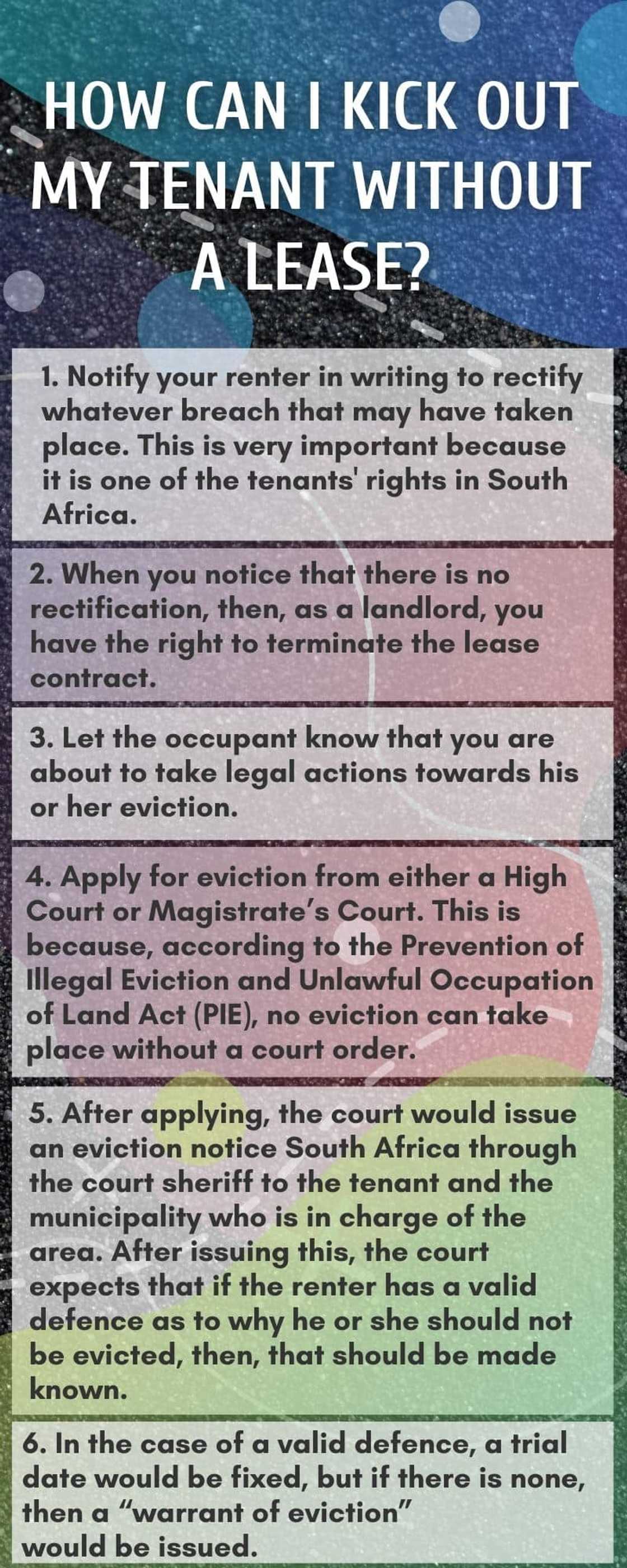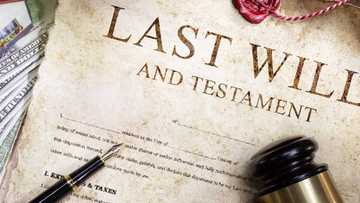How to evict a tenant without a lease in South Africa 2024?
Have you got a defaulting tenant in your property and you need to know the steps on how to evict a tenant without a lease in South Africa according to the law? Or do you need advice on what to do when your tenant refuses to vacate your property? Interestingly, these are part of the issues discussed in this article. So, whether you own a property or you are in charge of one, the steps that you can take in dealing with a defaulting tenant without a lease are discussed in this article as well as what you need to know about the rights of a renter.

Source: UGC
TABLE OF CONTENTS
A lot of reasons could warrant a landlord to want to evict his or her tenant. This could range from damages that the tenant is causing to the property, overstaying in the property after the lease has expired, or a continuous breaking of the rules binding on the contract and so on. Whatever the reasons(s) may be, what seems to be the most common among them all is late or nonpayment of the rent. Therefore, as the owner of a property, if you find yourself in such a situation and you need to get rid of the tenant, this article deals with the step-by-step guide that you should follow legally to accomplish that and the new eviction laws.
How can I kick out my tenant without a lease?
When it comes to kicking out your renter, there are processes that you have to follow so that, in the end, you would not have put the law into your hands. As stipulated by the Prevention of Illegal Eviction and Occupation of Land Act 19 of 1998, a landlord has to follow legislated procedure when he or she is dealing with tenants causing problems so that such could be evicted legally. So, in this case, the following are the eviction processes which you are required to follow:
- Notify your renter in writing to rectify whatever breach that may have taken place. This is very important because it is one of the tenants' rights in South Africa.
- When you notice that there is no rectification, then, as a landlord, you have the right to terminate the lease contract.
- Let the occupant know that you are about to take legal actions towards his or her eviction.
- Apply for eviction from either a High Court or Magistrate’s Court. This is because, according to the Prevention of Illegal Eviction and Unlawful Occupation of Land Act (PIE), no eviction can take place without a court order.
- After applying, the court would issue an eviction notice South Africa through the court sheriff to the tenant and the municipality who is in charge of the area. After issuing this, the court expects that if the renter has a valid defence as to why he or she should not be evicted, then, that should be made known.
- In the case of a valid defence, a trial date would be fixed, but if there is none, then a “warrant of eviction” would be issued.
What can I do if my tenant refuses to leave? Usually, an ultimatum of 30 days is given to the tenant to move out of the premises. However, if the renter fails to carry out the order within the stipulated time, then the sheriff can enforce the warrant of eviction which is an authorisation given to such to remove the possessions of the renter from the premises.
How do I evict a tenant who doesn't pay rent?
In a situation where an occupant fails drastically in paying his or her rent, there are steps that such a landlord can take to deal with the defaulting renter before taking further legal actions. Based on the steps discussed below, eventually, a landlord may not have to seek legal assistance.
1. Call up the occupant
The moment you notice a default in your tenant, the first step to take is to call him or her up and ask for payment. If the renter has a particular challenge that he or she is facing, you may both agree to when the payment would be made eventually.

Source: UGC
2. Send a breach of contract letter if there is a default
After you have both agreed on when the payment would be made and the renter defaults, the next thing that you can do is to forward a breach of contract letter wherein you will give seven days to remedy the default and also let the renter know your intention to take further steps if nothing is done. Note that the seven days notice is the stipulated date usually contained in a lease agreement South Africa.
3. You can send an intention to cancel the lease agreement
If the payment is not made within seven days, you can send a notice of cancelling the lease agreement in a written form. Also, expected to be contained in the notice, is an instruction to vacate the property immediately.
4. If the notice is absconded, seek legal assistance
After you have done all those and yet, the occupant refuses to obey, then, your only choice is to take legal actions and get an eviction order.
What are my rights as a tenant without a lease in South Africa?
Apart from the fact that landlords have right over their properties, it is also good to know that based on the rental laws in South Africa, tenants also have their rights as they occupy the property.
- As long as an occupant complies with the obligations that are contained in the lease agreement, he or she reserves the right to occupy the property that is rented.
- Before any changes, renovations or whatever can be carried out on the property, the tenant reserves the right to be consulted on issues that will affect him or her as an occupant.
- In a situation where a landlord sells off his or her property while the lease agreement is still effective, the renter has the right to keep staying in the property irrespective of the change in ownership.
- Based on the Rental Housing Act 1999, a minimum of one month notice must be given to a renter when a lease agreement is about to be cancelled. In fact, the Consumer Protection Act (CPA) grants tenants additional rights to allow them to cancel the lease agreement as long as a notice of 20 business days has been given. However, note that this can differ based on the structure of your lease agreement.
- In case you are late in the payment of your rent, your landlord must give you a “notice of breach” stating the breach based on the lease agreement. Then, he or she must also give you a chance to pay up the money before you can be sued.
- However, while considering tenants rights without a lease South Africa, a landlord does not have the right to evict a renter all by him or herself. A notice of eviction must be served the tenant from the court.
- In a situation whereby the renter has valid reasons why he or she should not be evicted, the law provides such with the right to be heard out in the court based on the provisions of the Prevention of Illegal Eviction and Unlawful Occupation of Land Act (PIE).
In summary, even though a landlord can determine what happens to his or her property, after agreeing with a tenant, under no circumstance does he or she have the right to evict the renter solely. In case the tenant defaults and the landlord is moved to get rid of the renter, the law expects that the steps on how to evict a tenant without a lease in South Africa must be followed. And this begins with serving a notice of eviction from the court. If the renter refuses to leave, the court sheriff can forcibly apply the eviction process and remove the occupant's properties from the premises.
DISCLAIMER: This article is intended for general informational purposes only and does not address individual circumstances. It is not a substitute for professional advice or help and should not be relied on to make decisions of any kind. Any action you take upon the information presented in this article is strictly at your own risk and responsibility!
Source: Briefly News





